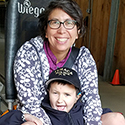Treatment for Children
Treatment of ependymoma depends on the type and location of the tumor, the age of the child, and if the tumor is newly diagnosed or has returned after treatment.
Treatment for children with ependymoma may include one or a combination of the following:
Surgery
Removing the tumor is usually the first step in cancer treatment if possible. Surgery is the main treatment for ependymoma. If all visible tumor is removed there is a better chance for long-term survival.
In children, staged surgeries are frequently used. In staged surgeries, instead of trying to remove the tumor all at once, neurosurgeons will take a small part out first. Then they shrink the tumor with chemotherapy or radiation therapy. After several months of treatment, the surgeon may go back in to remove the rest of the tumor.
Radiation Treatment
Radiation treatment is used frequently to treat ependymoma. This process uses external beams of X-rays, gamma rays or protons aimed at the tumor to kill cancer cells and shrink tumors. The treatment is usually given over a period of several weeks. Delivery techniques target the tumor while protecting nearby healthy tissue.
Radiation treatment in children can have serious long-term effects on the brain and other organs. It is important to have treatment performed at a center that specializes in ependymoma. It is also important to discuss the potential side effects and complications with your child’s doctor. Click here to read more about several specific radiation options and more. Watch the Ependymoma Essentials - Episode 2 Radiation Therapy for Pediatric Ependymoma video recording.
Chemotherapy
Chemotherapy may be used before surgery to make removal of the tumor safer and more complete. In young children, chemotherapy may be used to help delay radiation until the child is older. A combination of chemotherapy medicines is used to treat ependymoma.
Clinical Trials
Families might want to evaluate clinical trial options to consider for treatment. There are more clinical trials for relapsed disease than newly diagnosed. Ask your medical team what clinical trials might be recommended for your child depending on eligibility.
Alternative and Complementary Therapies
The CERN Foundation is not currently investigating the effects of alternative and complementary therapies on ependymoma. However, some patients research these options with the guidance of their physicians. Some options include massage or diet.
Your Child’s Medical Team
There are several members of your medical team that may be involved in your care.
Members of this neuro-oncology team typically include:
- Pediatric neuro-oncologist: A doctor who specializes in the diagnoses and treatment of central nervous system (CNS) tumors and other neurologic complications of cancer.
- Pediatric oncologist: A doctor who treats cancer, including CNS tumors.
- Pediatric neurologist: A doctor who manages disorders of the CNS.
- Pediatric neurosurgeon: A doctor who diagnoses and surgically manages CNS diseases.
- Radiation Oncologist: A doctor who plans and gives radiation therapy.
- Neuroradiologist: A doctor who diagnoses diseases of the CNS using imaging techniques such as MRI, CT scan, and PET scan.
- Neuropathologist: A doctor who examines CNS tissue to determine diagnosis.
- Neuropsychologist: A psychologist who studies the function and structure of the brain and the thinking, memory, and behavior changes that can result from problems in the brain.
- Psychologist: A healthcare professional who evaluates both normal and abnormal mental states and behavior.
- Social Worker: A healthcare professional who helps people cope and resolve problems in their everyday lives by providing guidance and resources.
- Genetic Counselor: A healthcare professional who evaluates risk and management of inherited conditions for people and families.
- Nurse Practitioner and Physician Assistant: A healthcare professional who diagnoses and manages acute and chronic illnesses.
- Nurse: A healthcare professional who cares for people, families, and communities, and oversees the management of care as prescribed by a doctor, nurse practitioner, or physician assistant. Nurses focus on inpatient care, outpatient care, hospice care, or management of research studies, as examples.
- Child Life Specialist: A healthcare professional who helps families cope with the challenges of hospitalization, illness, and disability
People with ependymoma should seek a medical diagnosis and disease care and treatment with a team experienced in their disease. We know you have lots of questions and we’re here to help provide answers. If you, or your medical team, have a specific question about ependymoma treatment, contact us.
Consulting with Dr. Google >
Hear from ependymoma caregiver, Tamiko, as she shares how to navigate the internet when searching for disease information.

